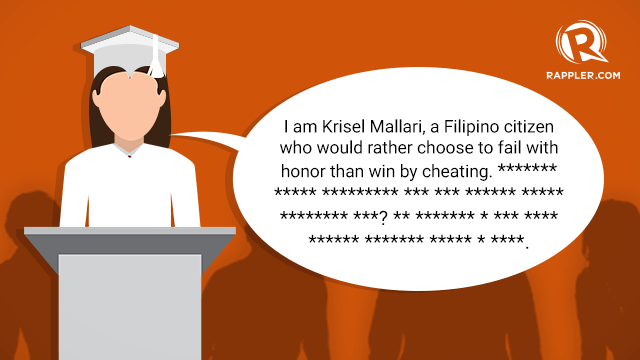SUMMARY
This is AI generated summarization, which may have errors. For context, always refer to the full article.

MANILA, Philippines – A viral YouTube video about a high school salutatorian whose speech was interrupted by school officials has put the tradition of graduation addresses in the spotlight.
Krisel Mallari, who was assigned to deliver the “welcome remarks” during the graduation of Sto Niño Parochial School in Quezon City, was not able to finish her speech which hinted at her school’s lack of fairness. (READ: Girl interrupted: School officials cut salutatorian’s speech)
SNPS explained the administration decided to stop Mallari’s speech as it was different from the one she submitted.
“Panuntunan ng paaralan na lahat ng talumpati ay kailangang aprubahan,” the school wrote. “Sinabihan si Krisel Mallari na kapag ito’y kanyang nilabag, hindi siya papayagan sa kanyang talumpati,” SNPS said in a statement.
(It is the policy of the school to approve all speeches. Mallari haa been told that if she doesn’t abide by this rule, she will not be allowed to deliver her speech.)
The school added the content of her speech was not considered a “welcome speech” since it was a blow to the class valedictorian and the school.
According to SNPC, they have exercised all the options to explain to the family the grades computation which Krisel’s family is contesting.
To screen or not to screen
The issue has sparked an online debate, particularly if speeches delivered by students should be screened.
The Department of Education (DepEd) questioned whether the graduation was the right forum for the student to “express freely” her thoughts and issues against the school. (READ: DepEd questions timing of QC salutatorian’s speech)
“Halimbawa, totoo, where do you say that? Do you say that in a graduation? May issues din yun. Because some issues cannot be resolved…maybe [it was] the right issue in the wrong forum,” Education Secretary Armin Luistro told Rappler on Tuesday, March 24.
(If the allegations were true, where do you air that? Do you say that in a graduation? That’s also an issue. Because some issues cannot be resolved…maybe [it was] the right issue in the wrong forum.)
But netizens and student groups criticized the policy of the SNPS on approving graduation speeches.




Freedom of expression
Meanwhile, the National Union of Students of the Philippines (NUSP) commended Mallari’s speech, saying “there is no venue more appropriate to voice out her plea for justice than her salutatorian speech.
“As a matter of fact, the injustices, lack of transparency and censorship have realistically pushed Krisel to deliver a heart-felt, genuine speech, even if this was ‘unapproved’ by school administrators,” the group said in a statement.
“Checking students’ commencement speeches does not simply mean checking the syntax and grammar of speeches,” according to the alliance of student leaders.
“The matter of all matters is very simple: school officials screen, not check, speeches to ensure that nothing against the school will be manifested by the students,” the group said.
NUSP urged schools to uphold freedom of expression even as it criticized the “vicious politics of grades and conservatism” in the country’s educational system.
“We call on all students, graduating or not, with or without honors, to deliver the truth in their schools and in the country,” NUSP said.
Should school officials screen the speeches of their students? Tell us what you think through @MovePH on Twitter or in the comment section below. – Rappler.com
Graduation speech vector via Shutterstock
Add a comment
How does this make you feel?
There are no comments yet. Add your comment to start the conversation.